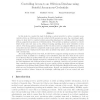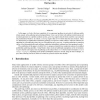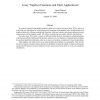12 search results - page 2 / 3 » Reducing Complexity Assumptions for Oblivious Transfer |
TCC
2004
Springer
13 years 10 months ago
2004
Springer
Quantum 2-party cryptography differs from its classical counterpart in at least one important way: Given blak-box access to a perfect commitment scheme there exists a secure 1−2...
ASIACRYPT
2007
Springer
13 years 11 months ago
2007
Springer
An extended abstract of this paper appears in Kaoru Kurosawa (Ed.): Advances in Cryptology ASIACRYPT 2007, volume 4833 of Lecture Notes in Computer Science, pages 265–282, Spring...
PKC
2009
Springer
14 years 5 months ago
2009
Springer
In this work, we consider the task of allowing a content provider to enforce complex access control policies on oblivious protocols conducted with anonymous users. As our primary ...
IPL
2010
13 years 3 months ago
2010
In this paper, we look at the time complexity of two agreement problems in networks of oblivious mobile robots, namely, at the gathering and scattering problems. Given a set of ro...
ECCC
2007
13 years 5 months ago
2007
We propose a general cryptographic primitive called lossy trapdoor functions (lossy TDFs), and use it to develop new approaches for constructing several important cryptographic to...



